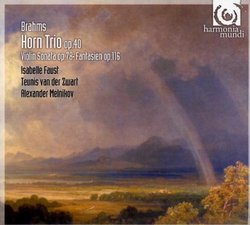Interesting Use of Historical Instruments
Lawrence A. Schenbeck | Atlanta, GA USA | 12/31/2008
(4 out of 5 stars)
"This lovely recording will be particularly interesting to aficionados of historical instruments. Isabelle Faust plays a Strad with gut strings, Teunis van der Zwart a 19th-century natural (i.e., valveless) horn, and Alex Melnikov an 1875 Boesendorfer piano. They tackle three wonderful Brahms chamber works, each of which has been recorded many times by top virtuosi on modern instruments.
I happened to have at hand recordings of all three works on modern instruments, which made comparisons possible. The results -- although subjective -- were surprising.
My overwhelming impression was that, in the Horn Trio, timbral and technical differences between the instruments render many interpretive choices insignificant. In Brahms, the development of thematic materials in all voices is of utmost importance. You want to be able to follow the musical ideas around, from instrument to instrument, to see how they grow, combine, fragment, etc. etc. in the drama.
That turns out to be a lot easier when you've got a Steinway, with its rich tone and long sustain; when you've got a violin with the power of steel strings; and even when you've got a valved horn. The modern instruments are just more capable of closely approximating one another in attacking, phrasing, and sustaining the notes. For better or worse, their timbres are more similar. You can hear the results in a performance from the Marlboro Festival -- Brahms: Sextet Op. 36; Horn Trio -- with Myron Bloom, Michael Tree, and Rudolf Serkin. They achieve tight ensemble more easily, and it's always clear that they're playing the same "song."
But maybe I'm making too much of all that. Will you enjoy this new recording? Absolutely. It is engineered well, in a way that emphasizes timbral differences: the horn fills the room, the piano less so (that pesky lack of sustain again), the violin least well (sounds a bit scrawny in fact). But they tackle the Horn Trio with full Romantic gusto. The combination of richly contrasting timbres is itself fascinating (and it's probably closer to what Brahms heard).
Melnikov also makes a satisfying meal of the Op. 116 Fantasies. Only perhaps in the G-major Violin Sonata could I have wished for greater expressive abandon -- here there are a number of competitive performances that could be recommended. (Although Isabelle Faust really shines in 20th-century repertoire, there's something a bit bleak about her view of Brahms...)"


 Track Listings (14) - Disc #1
Track Listings (14) - Disc #1